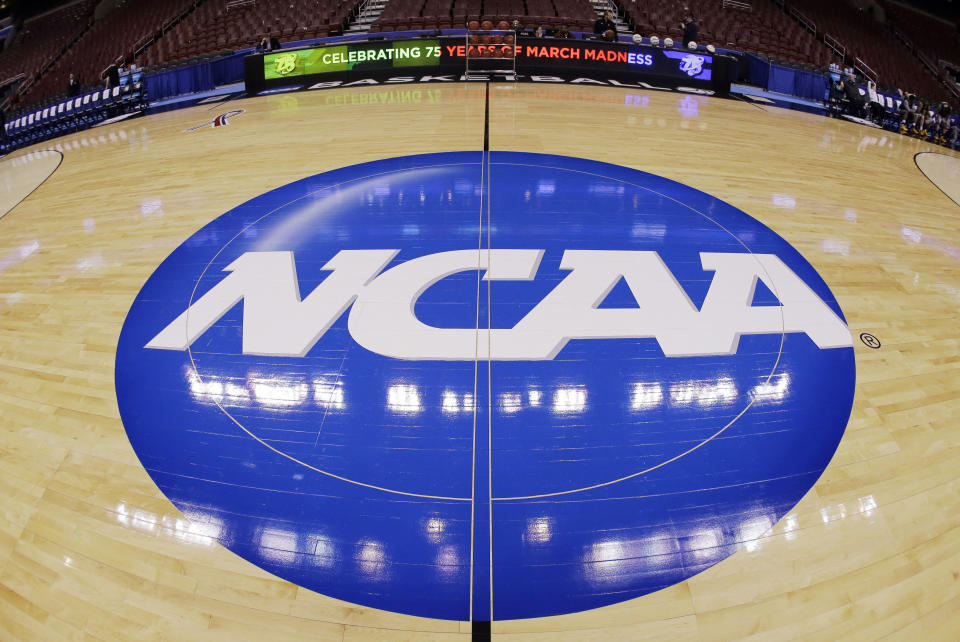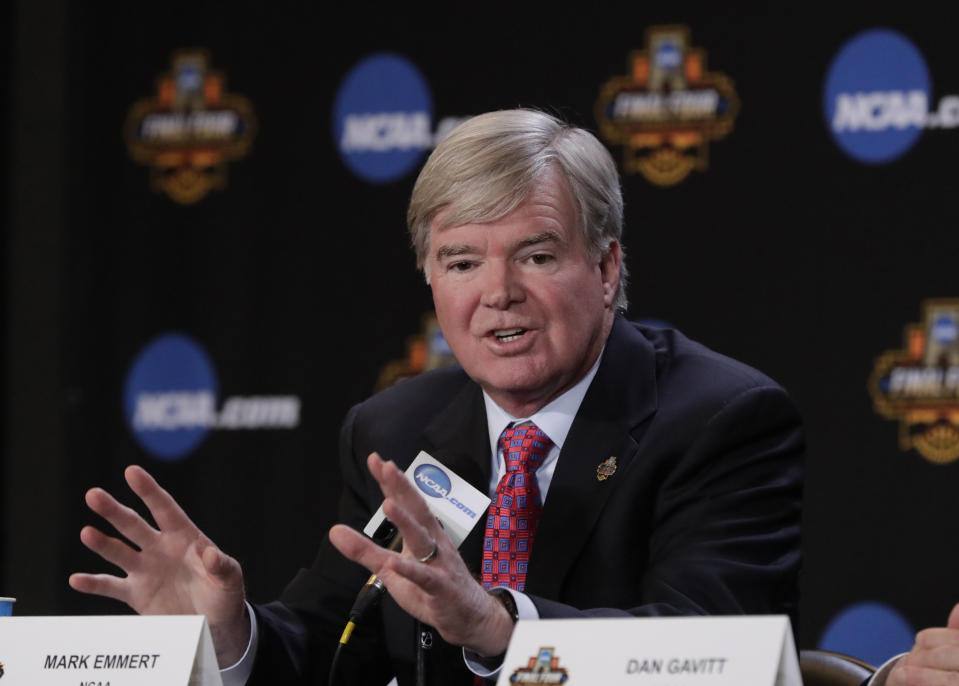NCAA facing crisis of confidence while feds dig in on scandal: 'I just don't have any faith in this system'
Earlier this month, USA Today released the first coaches poll for the 2017-18 men’s college basketball season. In a sign of the troubled times within the sport, 25 percent of the teams ranked in the top 16 are linked to the ongoing corruption investigation led by the U.S. Attorney’s Office in New York.
Are you ready for a potential FBI Final Four of Arizona (ranked fourth in the preseason), USC (11th), Miami (12th) and Louisville (16th)?
That would be the NCAA’s worst nightmare – its signature event and leading money-maker turning into an alleged scofflaw sideshow. While the odds of that quartet making it to San Antonio in April are not good, they’re not non-existent, either. And it’s entirely possible that the NCAA would be powerless to do anything about it.
If the 2017-18 college sports year includes a bombshell basketball scandal, North Carolina going unpunished for 18 years of academic fraud and a deep NCAA tournament run by one or more hoops programs under federal scrutiny, it could do profound damage to college sports’ credibility.
Consider what three veteran members of the college sports establishment said about the current landscape.
“I just don’t have any faith in this system,” said former Big East commissioner Mike Tranghese.
“Clearly, this is not a shocking development,” said Big Ten commissioner Jim Delany.
“For a relatively lengthy period of time, there’s been a crisis of confidence,” said Nebraska law professor Josephine Potuto, who also is the school’s faculty athletic representative and a longtime member of the NCAA’s Committee on Infractions. “I don’t say it’s necessarily the fault of the association, but it exists. … I do find it all depressing.”

This week at a meeting of the Knight Commission on Intercollegiate Athletics, NCAA president Mark Emmert put data behind the rampant pessimism. Emmert cited an internal survey that said 51 percent of respondents do not trust the NCAA.
“Those are numbers that should cause us a lot of anxiety,” Emmert told the commission.
With that unsettling backdrop, the NCAA is perilously positioned to do little about what could become the biggest college basketball scandal since the point-shaving episodes of the 1950s. The action is happening out of the Southern District of New York, which is handling the investigation. It’s not happening in Indianapolis, at NCAA headquarters.
As a once-a-generation scandal unfolds, NCAA enforcement is watching from the sidelines like everyone else. The notion of the NCAA unable to dig into this case for weeks, and likely months, underscores the limitations of the organization’s leadership and the investigative tools at its disposal. Officials say these limitations hint at big-picture changes.
“In regard to specific allegations referenced in the criminal complaint, the NCAA does have to wait and see how it plays out,” said Atlanta attorney Stu Brown, who has represented a host of coaches and schools in NCAA infractions cases. “I don’t think the US Attorney’s Office is eager to share in-progress investigative information with the NCAA. And I think the NCAA would be very leery of getting in the way of a government investigation.”
So as federal officials probe, the NCAA waits. And it waits somewhat in the dark. The governing body of college sports didn’t know the original bombshell federal complaint was coming, and while NCAA officials are in contact with the feds, they aren’t necessarily going to be apprised of what will happen next.
At this point, the NCAA is just another anxious, curious onlooker, keeping vigil and searching for signals as to how far the scandal will spread across its membership. In public statements, the NCAA has made it clear that it will defer to the federal authorities. The NCAA declined further comment to Yahoo Sports.
“I’d be surprised if whoever is the lead prosecutor doesn’t sit down with the NCAA and say, ‘You need to stand down,’ “said Roscoe Howard, a former U.S. Attorney who spent nearly six years as a member of the NCAA Committee on Infractions. “I’d be very surprised if the NCAA didn’t cede to that.”
Cede to it grudgingly, perhaps. One former NCAA investigator told Yahoo Sports it will look “hideous” for the association to simply sit idle while a potentially massive scandal is investigated by the feds while the season plays out. And while a precise timeline is impossible to determine, lawyers involved with the case say it wouldn’t be surprising if it took more than two years to play out.

The NCAA may not have to wait the entire time, but it’s still on pause until the federal investigators indicate otherwise. According to a source, this pause includes forbidding on-campus compliance officers to question student-athletes linked to the investigation.
Perhaps aware of the bad optics and trying to increase its marginalized role, the NCAA has at least done something. In mid-October it launched a two-part initiative:
· A memo from the Board of Governors and Board of Directors basically telling every member school to investigate itself. The directive required “all Division I institutions to examine their men’s basketball programs for possible NCAA rules violations, including violations related to offers, inducements, agents, extra benefits and other similar issues. With the imminent start to the Division I men’s basketball season, we urge institutions first to review whether there are any eligibility consequences arising from previously undiscovered rules violations. Those eligibility reviews should be completed immediately.” There’s at least 10 players mentioned in the federal complaints that are enrolled in NCAA schools. The initial decisions certifying the eligibility of those players will be made on campus before being forwarded to the NCAA, which is the typical process.
One longtime athletic administrator termed that Board of Governors directive a “C.Y.A. move” by the NCAA. Another referred to it as “looking under the cushions, pulling up the rug.” It does call to mind the John Wooden aphorism, “Don’t mistake activity for achievement.”
· The formation of a committee to explore potential remedies to the problems that have plagued men’s basketball for decades. That committee held its first meeting via teleconference earlier this month, and will continue to meet until offering its results in April. Among the issues it will wrestle with: the pervasive and at times corrosive influence of non-scholastic third parties and shoe companies; the effect of the NBA’s “one-and-done” rule that pushes top players into college for one year before they can declare for the draft; and the chronically troublesome presence of agents and financial advisers who have little regard for NCAA rules. (Notably absent from the committee’s mission: Any significant exploration of abandoning or altering the eternally problematic amateurism model. That’s not on the table.)
Emmert himself is on that committee, and made himself available for comment to Yahoo Sports about it at the time it was announced. Emmert seems to have a good sense that his out-front involvement in this crisis will be important.
“Whatever the tone is coming down from Mark Emmert will determine the scope of the investigation,” said the former NCAA investigator. “Does he say, ‘We want you to be aggressive and go after this, or is this just cross our T’s and dot our I’s?’ The tone is always dictated by the leadership.”
A major question that is not being addressed at the moment, at least in any formal capacity: When the NCAA is finally free and clear to investigate and prosecute any and all offenders related to this case, can it adequately do the job and swing the hammer? In other words, can the enforcement staff continue to justify its existence as the police force of college sports?
There are some in the college sports realm who have their doubts. The idea of outsourcing NCAA enforcement, getting it out from under supervision of the association’s leadership structure, has been gaining steam in recent years. The attraction: Fewer inherent conflicts of interest, and perhaps more latitude as an investigative body than is currently allowed by the NCAA bylaw structure.
“It’s notable that it took the FBI, with its deep resources and subpoena power, two years to uncover the activities that have been alleged in the indictments,” said Pac-12 commissioner Larry Scott. “The complexity of the issues makes clear that we need to take a hard look at a stronger and adequately resourced enforcement system, as well as reform in the recruitment environment itself. Those of us who are leaders in college athletics must address these challenges head on.”
There is one quaint concept that could make the current enforcement system work much more effectively: Accountability from the member schools. It seems to be in increasingly short supply.
To an ever-increasing degree, the response to any form of NCAA-related scandal seems to be damage control over finding facts and facing the music. Getting away with it has superseded getting to the bottom of it. That’s why lawyers such as Brown and Mike Glazier roll up billable hours helping coaches and schools try to wriggle off the hook when accused of violations.
Miami knew it had a major compliance problem several years ago stemming from infamous imprisoned booster Nevin Shapiro, but the school assailed the NCAA investigative process and the sanctions were mitigated. North Carolina swallowed its academic pride and declared sham classes legit in order to escape penalties earlier this month. Mississippi dug in tenaciously behind former football head coach Hugh Freeze in the face of being charged with major violations. Louisville launched an appeal on behalf of former basketball head coach Rick Pitino when he was suspended for five games in the “StripperGate” ruling earlier this year. (Other scandals wound up costing Freeze and Pitino their jobs before final rulings were made by the NCAA.)

As a collective, the NCAA membership has called for increasingly harsh penalties for rule breakers. But individually, the resistance to those penalties has been fierce.
“Every school says we need to improve enforcement,” Tranghese said. “But every school goes before the NCAA Committee on Infractions and cries bloody murder.”
The NCAA enforcement inertia offers a convenient window for self-reflection on the paradoxes that define modern college sports. There’s a cooperative model where members aren’t cooperating and an enforcement system where the investigators can’t investigate. They help enable an amateurism system that fuels a billion-dollar industry, a tension that becomes more palpable with each lucrative television contract.
Is this scandal the pressure point for gradual evolution or seismic change? Does the scandal produce the NCAA committee that recommends a bold modernization of a balky system? The biggest cause for optimism, considering the NCAA’s famous reluctance to evolve, comes from just how ugly things can get in the federal investigation.
“It will be ugly and there will be a lot of embarrassment,” one athletic director said. “But the end result could be the best thing that’s happened to college basketball in a long time.”
More from Yahoo Sports:
• What Garoppolo trade tells us about Belichick
• Refs leave field after high school anthem protest
• NFL-best Eagles improve with trade for Pro Bowl RB
• Jackie Robinson cap testifies to racist era

